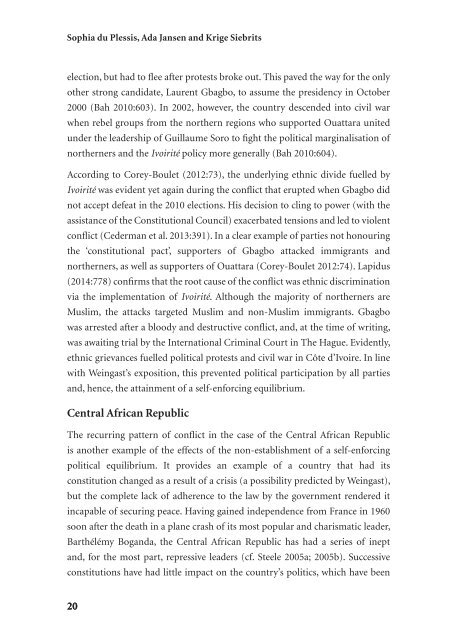ACCORD-ajcr-2015-1
ACCORD-ajcr-2015-1
ACCORD-ajcr-2015-1
- No tags were found...
You also want an ePaper? Increase the reach of your titles
YUMPU automatically turns print PDFs into web optimized ePapers that Google loves.
Sophia du Plessis, Ada Jansen and Krige Siebrits<br />
election, but had to flee after protests broke out. This paved the way for the only<br />
other strong candidate, Laurent Gbagbo, to assume the presidency in October<br />
2000 (Bah 2010:603). In 2002, however, the country descended into civil war<br />
when rebel groups from the northern regions who supported Ouattara united<br />
under the leadership of Guillaume Soro to fight the political marginalisation of<br />
northerners and the Ivoirité policy more generally (Bah 2010:604).<br />
According to Corey-Boulet (2012:73), the underlying ethnic divide fuelled by<br />
Ivoirité was evident yet again during the conflict that erupted when Gbagbo did<br />
not accept defeat in the 2010 elections. His decision to cling to power (with the<br />
assistance of the Constitutional Council) exacerbated tensions and led to violent<br />
conflict (Cederman et al. 2013:391). In a clear example of parties not honouring<br />
the ‘constitutional pact’, supporters of Gbagbo attacked immigrants and<br />
northerners, as well as supporters of Ouattara (Corey-Boulet 2012:74). Lapidus<br />
(2014:778) confirms that the root cause of the conflict was ethnic discrimination<br />
via the implementation of Ivoirité. Although the majority of northerners are<br />
Muslim, the attacks targeted Muslim and non-Muslim immigrants. Gbagbo<br />
was arrested after a bloody and destructive conflict, and, at the time of writing,<br />
was awaiting trial by the International Criminal Court in The Hague. Evidently,<br />
ethnic grievances fuelled political protests and civil war in Côte d’Ivoire. In line<br />
with Weingast’s exposition, this prevented political participation by all parties<br />
and, hence, the attainment of a self-enforcing equilibrium.<br />
Central African Republic<br />
The recurring pattern of conflict in the case of the Central African Republic<br />
is another example of the effects of the non-establishment of a self-enforcing<br />
political equilibrium. It provides an example of a country that had its<br />
constitution changed as a result of a crisis (a possibility predicted by Weingast),<br />
but the complete lack of adherence to the law by the government rendered it<br />
incapable of securing peace. Having gained independence from France in 1960<br />
soon after the death in a plane crash of its most popular and charismatic leader,<br />
Barthélémy Boganda, the Central African Republic has had a series of inept<br />
and, for the most part, repressive leaders (cf. Steele 2005a; 2005b). Successive<br />
constitutions have had little impact on the country’s politics, which have been<br />
20


